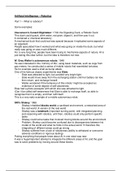Summary
Summary Robotics AI
- Course
- Institution
Summary of the topic 'Robotics' covered in this course, extensively explained including all important terminology. Recommand to buy the bundel to get a full overview of all topics from the course. Passed the course with an 8,5 using the bundel with summaries!
[Show more]



